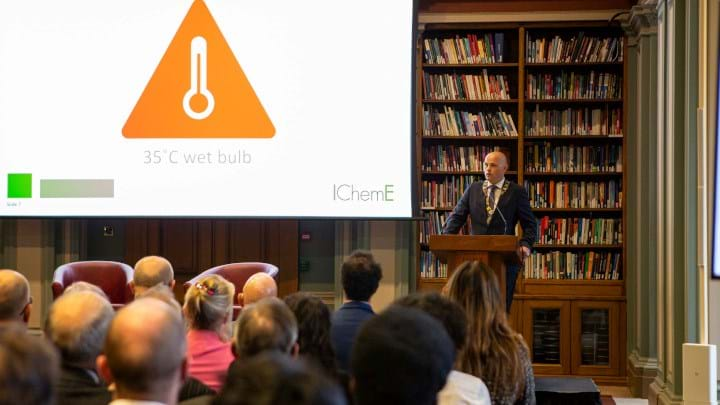Apsey calls on chemical engineers to ‘transform our industries’

IChemE president says the skill sets of chemical and process engineers will be critical to delivering a just transition
THE CLIMATE took centre stage as Mark Apsey used his presidential address as a rallying call to chemical engineers to “transform our industries”.
The IChemE president was addressing members, trustees, and invited guests at the Royal Society of Chemistry HQ at Burlington House, London shortly after replacing Nigel Hirst in the role.
Apsey acknowledged the many challenges facing the world during his address, while emphasising chemical engineers’ long history of finding innovative solutions.
He said: “We should own and be proud of the things we have contributed to society whilst recognising that society now needs us to apply our skills to transform our industries to deliver in a different and sustainable way.”
In a room populated by old heads and students alike, Apsey reminded attendees of IChemE’s Climate Change Statement from 2022, which included the commitment to develop economically sustainable plans to help the chemical engineering profession transition to net zero.
He said: “We must strive to redesign and re-engineer processes to deliver essential products in a sustainable way. The obligation is on all of us.”
Past Achievements
Apsey has been volunteering for IChemE since his student days at the University of Exeter in the 1990s. He became a Fellow in 2018, and chaired the Institution’s Energy Centre, engaging with global government officials at COP22 and COP23.
He took audience members back to his school years and recalled how his teachers and father John Apsey, who was in attendance, inspired him to go down the route of chemical and process engineering.
“I wanted to continue learning in a topic that used all my A-levels, was challenging, was vocational but kept options open for many future career paths. Chemical engineering was the thing!”
Coming full circle, the new president announced that, with the support of IChemE, chemical engineering will once again be offered as a degree course at his alma mater.
He said: “I was part of the last cohort to graduate before the course was closed, and I am extremely happy that we are able to support the engineering department there to create new capacity for young people to enter our profession.”
A keen historian, Apsey talked about the formative work of the scientists and engineers who laid the groundwork for climate science, including Swede Svante Arrhenius.
“In April 1896, [Arrhenius] published a paper that was the first to try and quantify the contribution of carbon dioxide to the greenhouse effect and to speculate about whether variations in the atmospheric concentration of carbon dioxide have contributed to long-term variations in climate.
“We now have a huge body of work looking at the science of Earth’s climate and sophisticated ways to measure and analyse what’s going on.”
This article is adapted from an earlier online version.
Recent Editions
Catch up on the latest news, views and jobs from The Chemical Engineer. Below are the four latest issues. View a wider selection of the archive from within the Magazine section of this site.




